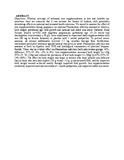Safety and efficacy of antenatal iron supplementation in a malaria-endemic area in Kenya: A randomised trial

View/
Date
2015Author
Mwangi, Martin N
Roth, Johanna M
Smit, Menno
Trijsburg, Laura
Mwangi, Alice
Demir, Ayşe Y
Mens, Petra
Prentice, Andrew M
[et al.]
Type
enLanguage
enMetadata
Show full item recordAbstract
Objectives: Whereas coverage of antenatal iron supplementation is low and benefits are uncertain, there are concerns that it can increase the burden of malaria, with potentially devastating effects on maternal and neonatal health outcomes. We aimed to measure the effect of iron supplementation during pregnancy on maternal Plasmodium infection assessed at delivery, birth weight, gestational age, fetal growth and maternal and infant iron status.
Methods: Rural Kenyan women (n=470) with singleton pregnancies, gestational age 13─23 weeks and haemoglobin concentration ≥ 90 g/L were randomised to supervised daily supplementation with iron (60 mg as ferrous fumarate) or placebo until 1 month postpartum. To prevent severe anaemia, all women additionally received 5.7 mg iron/day through flour fortification. Intermittent preventive treatment against malaria was given as usual. Plasmodium infection was assessed at birth by dipstick tests, PCR and histological examination of placental biopsies.
Results: There was no evident effect on Plasmodium infection (both intervention groups: 45%; difference, 95% CI: 0%, ─9% to 9%). Iron supplementation increased birth weight by 143g (95% CI: 58─228g) and reduced the prevalence of low birth weight (<2,500g) by 65% (95% CI: 13%─86%). The effect on birth weight was larger in women who were initially iron-deficient than in those who were iron-replete (250 g versus ─13 g; p-interaction=0.008), and the improved birth weight seemed achieved mostly through improved fetal growth. Iron supplementation resulted in improved maternal iron status at 1 month postpartum, and improved infant iron stores.
Citation
Mwangi, M. N., Roth, J. M., Smit, M., Trijsburg, L., Mwangi, A., Demir, A. Y., ... & Verhoef, H. (2015). Safety and Efficacy of Antenatal Iron Supplementation in a Malaria-endemic Area in Kenya: A Randomised Trial. EJNFS, 5(5): 627-628,Publisher
University of Nairobi
Collections
- Faculty of Health Sciences (FHS) [10378]
